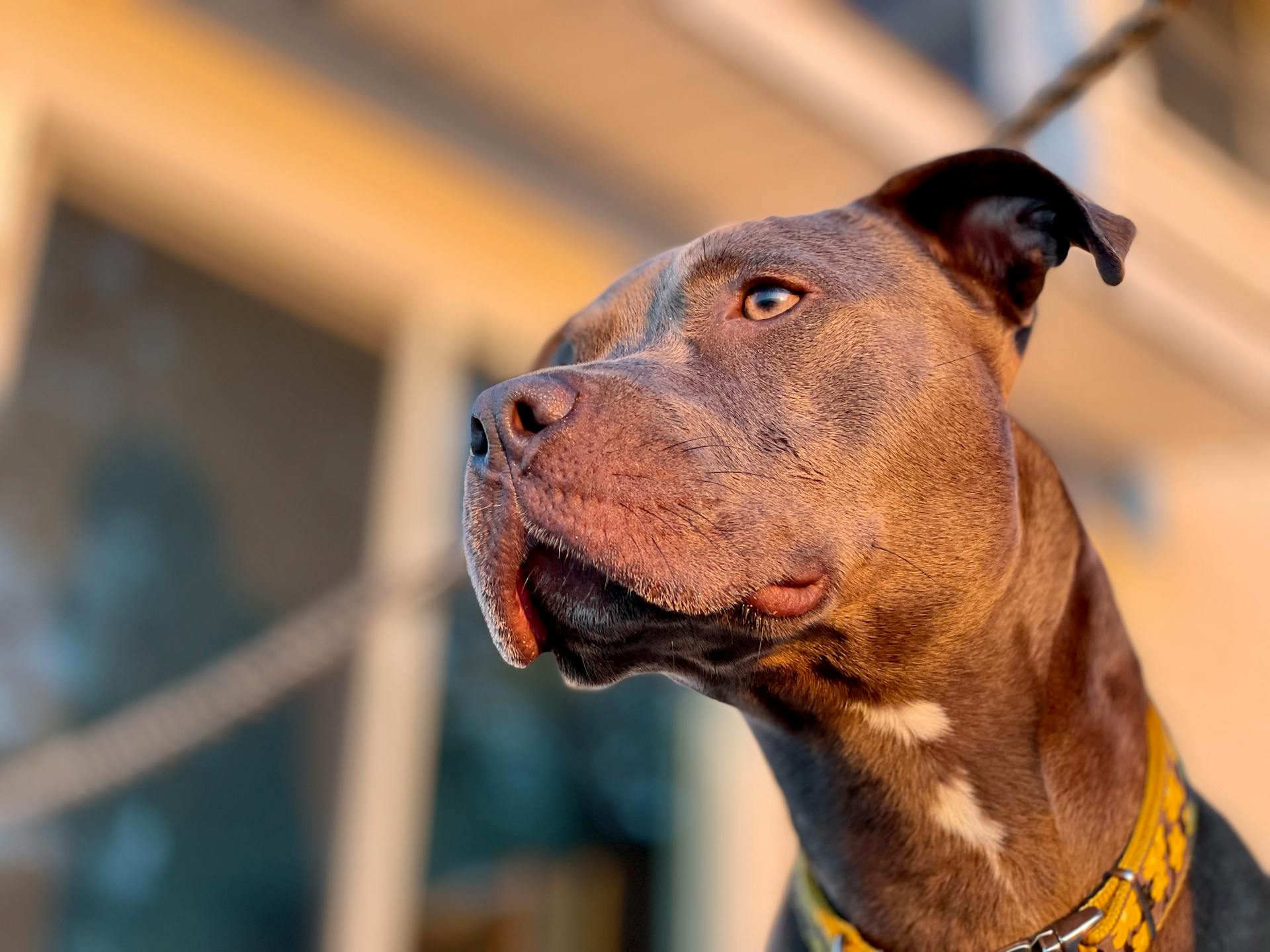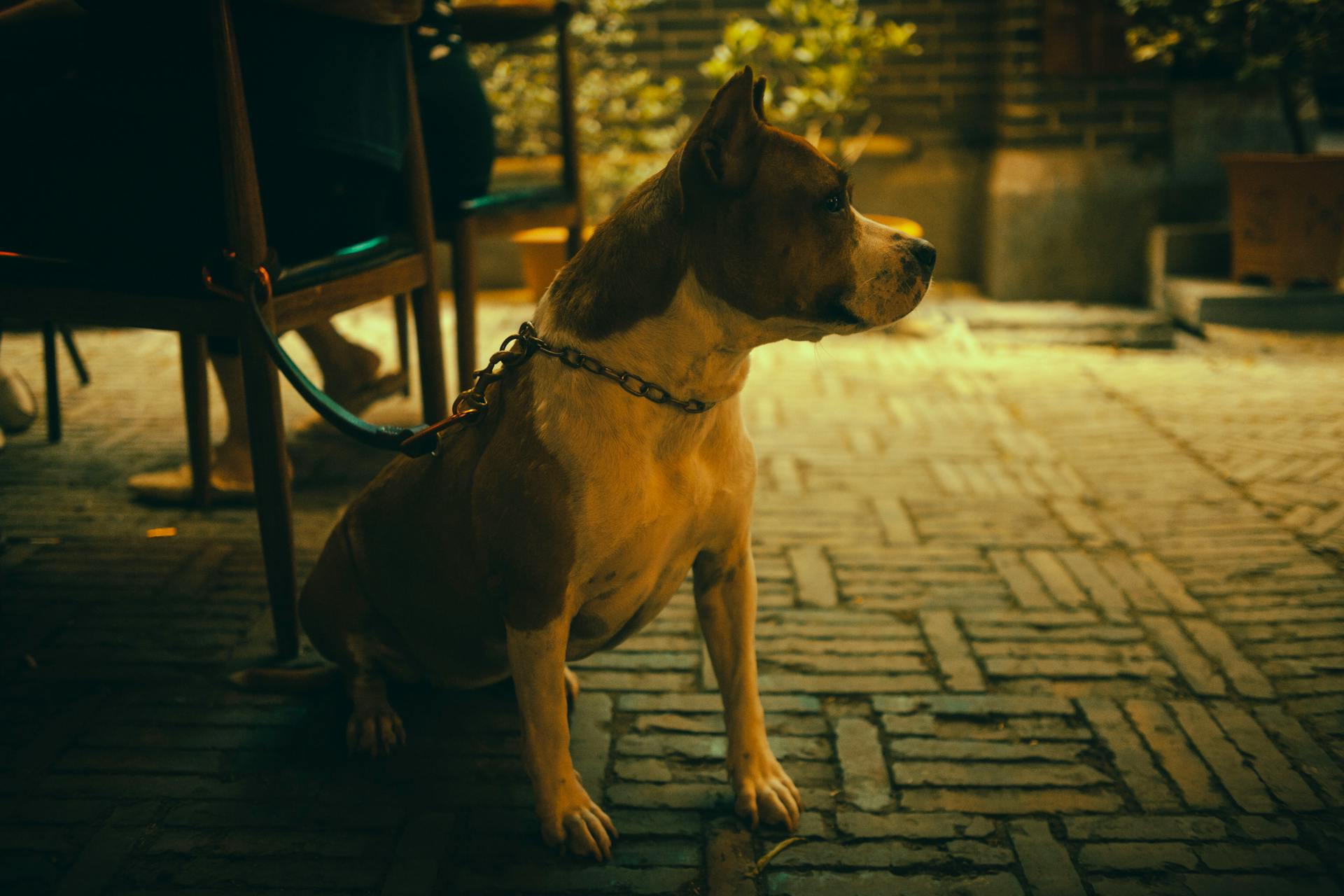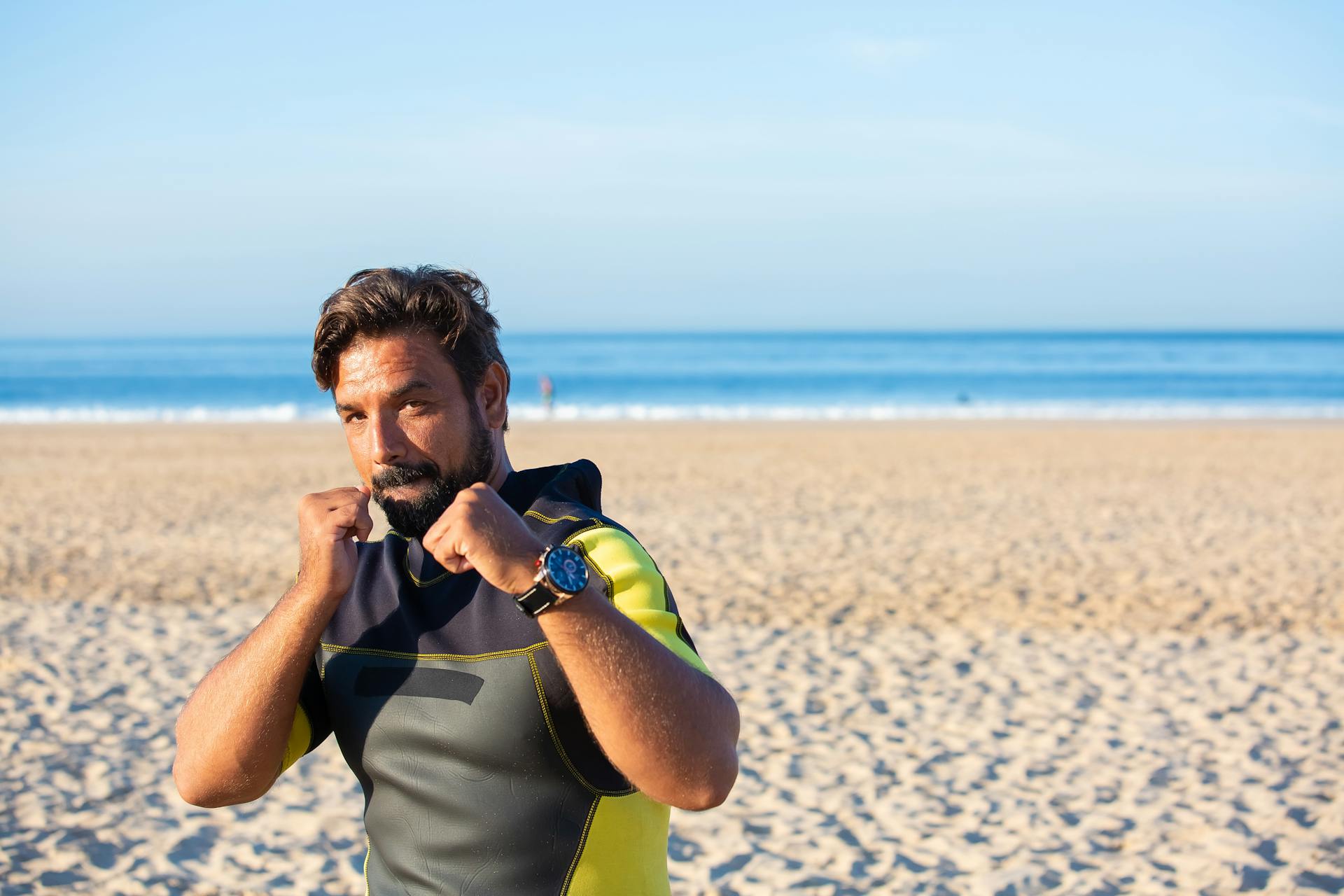
The Mini Bull Terrier and the Bull Terrier may look similar, but they have some key differences. The Bull Terrier was originally bred in England in the 19th century, with a focus on creating a fierce and agile fighting dog.
One of the most noticeable differences between the two breeds is their size. The Mini Bull Terrier typically weighs between 16 and 28 pounds, while the Bull Terrier weighs between 50 and 80 pounds. This size difference affects their exercise needs and living arrangements.
Breed History
The Miniature Bull Terrier and Bull Terrier breeds have a rich history that dates back to the mid-1800s in England.
The Miniature Bull Terrier was initially developed by crossing an Old English Bulldog with the now-extinct White English Terrier, resulting in a feisty and high-spirited ratting dog.
The breed was later used for pit fighting, but when the practice was banned, it continued to be a useful earth dog and companion.
The Miniature Bull Terrier was recognized as a separate breed by the American Kennel Club in 1991.
The Bull Terrier, on the other hand, was probably created by crossing a Bulldog with the now-extinct White English Terrier in 1835.
These early "bull and terrier" dogs were later crossed with Spanish Pointers to increase their size, making them formidable gladiators in the dogfighting ring.
The breed's nickname "White Cavalier" was given to them due to their courage in the ring and their courtly demeanor towards people.
The first Bull Terrier registered by the American Kennel Club was Nellie II in 1885.
The Miniature Bull Terrier is a smaller version of the Bull Terrier, and its popularity has soared in recent years, with many people finding it to be a unique and affectionate addition to their family.
The breed's history of being used for hunting has given it an athletic and protective streak, making it a loyal companion today.
Intriguing read: American Kennel Club Lancashire Heeler
Breed Characteristics
Miniature bull terriers are a unique breed with some distinct characteristics. They typically weigh between 24 to 33 pounds and stand 10 to 14 inches tall.
Their coat is short, coarse, and straight, which makes grooming a relatively easy task. They shed very little, if at all.
Their temperament is quite interesting, as they can be protective, loyal, and stubborn at times. They're also athletic, which is evident in their energetic behavior.
Miniature bull terriers are generally good with kids, but this may vary depending on the individual dog's personality. They can also get along with other animals, although this also depends on the dog's temperament.
One notable aspect of miniature bull terriers is their intelligence, which can make them relatively easy to train. However, their independent nature can sometimes make training a bit more challenging.
In terms of energy level, miniature bull terriers are quite active and require regular exercise to keep them happy and healthy. Their barking habits are not mentioned in the article, but it's worth noting that bull terriers are known to be relatively quiet dogs.
Their lifespan is relatively long, ranging from 10 to 14 years with proper care and attention.
Take a look at this: What Are the 14 Ancient Dog Breeds
Health and Care
Miniature bull terriers are generally healthy, but like all purebred dogs, they can be prone to certain health issues. Deafness, eye problems, and kidney problems are some of the health conditions that may be seen in the breed.
You'll want to take your dog to the veterinarian regularly to catch any health issues before they become serious. A healthy lifestyle and a good diet are also essential to prevent serious health problems in your dog.
Miniature bull terriers may be prone to glaucoma, which can be diagnosed and treated at a relatively low cost. The cost to diagnose and treat glaucoma can range from $1,500 to $5,000.
To ensure your dog stays healthy, make sure to provide a high-quality diet and regular veterinary check-ups. You can also watch your dog's behavior to catch any potential problems early on.
Here are some key health issues to be aware of in miniature bull terriers:
In addition to regular veterinary check-ups, you'll also want to make sure your dog gets plenty of exercise and mental stimulation. Miniature bull terriers need at least an hour of playtime and two to three walks per day to stay healthy and physically stimulated.
Temperament and Behavior
The Miniature Bull Terrier is a lively, mischievous, and loyal breed that's perfect for families with older children. They're highly intelligent and easy to train, but they need plenty of interaction and exercise to keep them happy and healthy.
Their independent nature means they can be stubborn at times, but with consistent training from a young age, they'll learn to respect boundaries and live harmoniously with people.
Miniature Bull Terriers are active and cheerful playmates for kids, but they're too rambunctious for toddlers. They'll entertain themselves with tail chasing if they don't get enough exercise and human contact, so make sure to provide them with plenty of physical and mental stimulation.
They're generally good with other dogs their size or larger, but toy dogs and cats may trigger their prey drive, so it's best to keep them separate. With proper socialization from an early age, they can learn to coexist with other animals, but it's essential to supervise interactions closely.
Overall, Miniature Bull Terriers are a fun-loving and entertaining breed that thrive on human interaction and activity. With the right care and attention, they'll become loving and loyal companions for many years to come.
On a similar theme: Are Border Collies Loyal
Traits and Behavior
The Miniature Bull Terrier is a lively, mischievous, and loyal breed that thrives on human interaction. They are highly intelligent and easy to train, but they need a lot of interaction to prevent boredom and destructive behavior.
They are generally good with older children, but may not be suitable for toddlers due to their rambunctious nature. However, with proper training and socialization, they can make excellent playmates for kids.
Miniature Bull Terriers are naturally protective of their family and territory, which can make them wary of strangers. They may take time to warm up to new people, but once they feel comfortable, they can be very affectionate.
They have a strong prey drive, which means they may not get along with smaller animals like cats or toy dogs. It's essential to socialize them from an early age to prevent chasing and killing these animals.
These dogs are highly energetic and need at least an hour of playtime each day. They require regular exercise, including walks and playtime in open areas, to keep them happy and healthy.
Their independent nature can sometimes make them stubborn, but with consistent training and positive reinforcement, they can learn to behave well. They are also known to be comical and entertaining, often enjoying activities like agility and obedience training.
Overall, the Miniature Bull Terrier is a unique and lovable breed that requires attention, exercise, and training to thrive. With patience and understanding, they can become wonderful companions for many families.
Are Intelligent?
Miniature bull terriers have an average intelligence. They are curious, alert, and able to learn new things.
Their intelligence can be a double-edged sword, as they have a stubborn streak that causes them to use their intelligence for mischief if they feel their needs aren’t being met.
You can train your miniature bull terrier, and regular training is essential to keep them well-behaved.
Maintenance and Training
Mini bull terriers require regular grooming to prevent shedding and dental issues. They need to be brushed once a week with a rubber mitt, and daily brushing during shedding seasons will help significantly.
Mini bull terriers are a rambunctious breed that needs a lot of exercise, but they can do well in apartments and urban areas if given the opportunity to burn off their energy.
Feeding your mini bull terrier depends on their activity level, age, and metabolism, and they need between 1.5 and 4.25 cups of food divided into two meals daily. It's essential to consult with your veterinarian to determine the right amount of food for your dog.
Mini bull terriers can be stubborn and require patience and consistency when training. They may learn complex tricks and hunting commands with positive reinforcement, but they might not be the best choice for inexperienced handlers.
Additional reading: Best Food for English Bull Terrier
What Size?
A miniature bull terrier is a small dog, and this pup will stand between 10 and 14 inches tall, and they typically weigh between 24 and 33 pounds.
Male miniature bull terriers will typically be slightly taller and weigh more than females of this breed.
A unique perspective: Will Shiba Inu Reach $1

To keep up with their energetic nature, you'll want to ensure they get plenty of exercise, but their small size means they don't need as much space as larger breeds.
Their compact size also makes them a great fit for city living or apartments, as long as they get regular walks and playtime.
Breed Maintenance
Miniature Bull Terriers have average grooming needs, and they will need to be professionally groomed every so often.
Their coat is short, coarse, and straight, and they tend to shed somewhat year-round, requiring regular brushing to prevent excessive shedding.
You should brush your Miniature Bull Terrier's coat a few times a week to remove any shed fur and keep their coat looking smooth.
Daily brushing will be necessary during their twice-yearly shedding season to keep all the hair under control.
Bathing is not necessary unless absolutely needed, and you can use a dry shampoo or dust off with a damp cloth.
Discover more: Will Shiba Inu Hit $1
You should also brush your Miniature Bull Terrier's teeth at least two or three times a week to remove tartar buildup and bacteria, and daily is even better.
Trim their nails once or twice a month or as needed, and if you can hear the nails clicking on the floor, they're too long.
Start getting your Miniature Bull Terrier used to being brushed and examined when they're a puppy, and handle their paws frequently to make grooming a positive experience.
You'll need to trim their nails and fur as needed depending on how fast both grow, and weekly ear checks for debris and dirt are also important.
Cleaning their ears, brushing their teeth, and trimming their nails are all part of regular maintenance for Miniature Bull Terriers.
Training
Training a Bull Terrier requires consistency and patience, as they can be stubborn at times. They may not be the best choice for inexperienced handlers due to their independent nature.
Consistency is crucial when training a Bull Terrier, and daily training sessions are essential. Aim for at least one 15-20 minute training session each day.
Their stubborn streak can get in the way of training, but with positive reinforcement, they can learn complex tricks and hunting commands.
Broaden your view: Shiba Inu Stubborn
Frequently Asked Questions
What are the four types of Bull Terriers?
There are four main types of Bull Terriers: Brindle and white, White, Red and white, and Modern-colored. The Miniature Bull Terrier is also a recognized variation of the breed.
What are the 4 types of Bull Terriers?
There are four main types of Bull Terriers: Brindle and white, White, Red and white, and Modern-colored. The Miniature Bull Terrier is also a recognized variation of the breed.
What is the life expectancy of a Miniature Bull Terrier?
Miniature Bull Terriers typically live for 13 to 15 years, requiring a long-term commitment from their owners.
Is the Miniature Bull Terrier the same as a Bull Terrier?
The Miniature Bull Terrier is a smaller version of the Bull Terrier, sharing most of its characteristics. Despite its smaller size, it retains the breed's signature terrier spirit and fearlessness.
Featured Images: pexels.com


